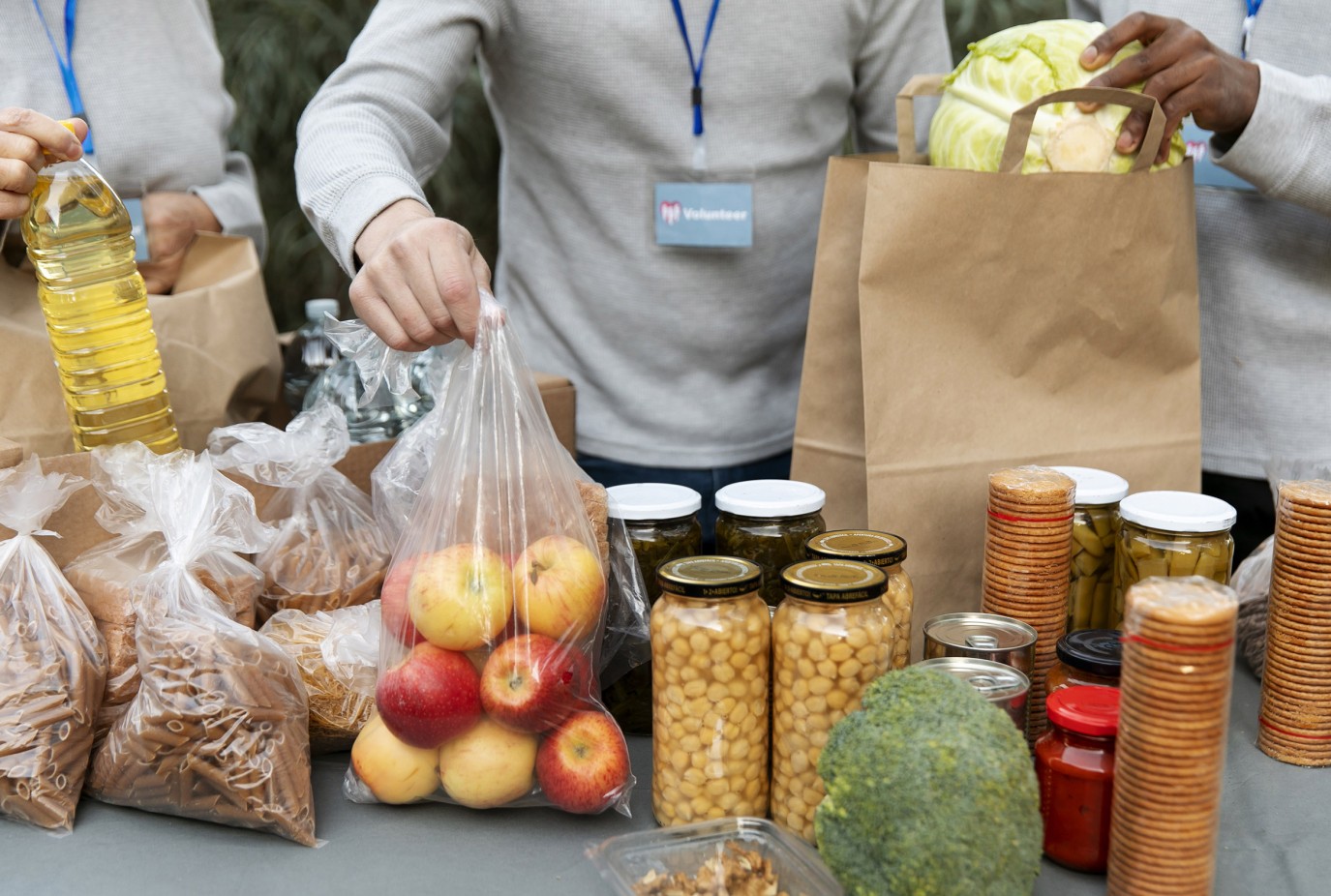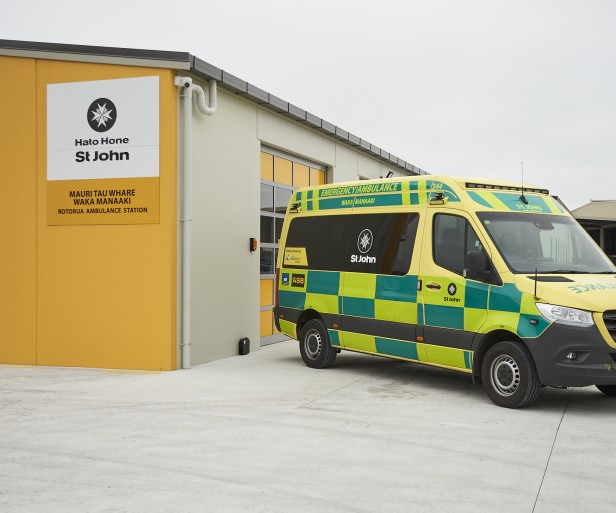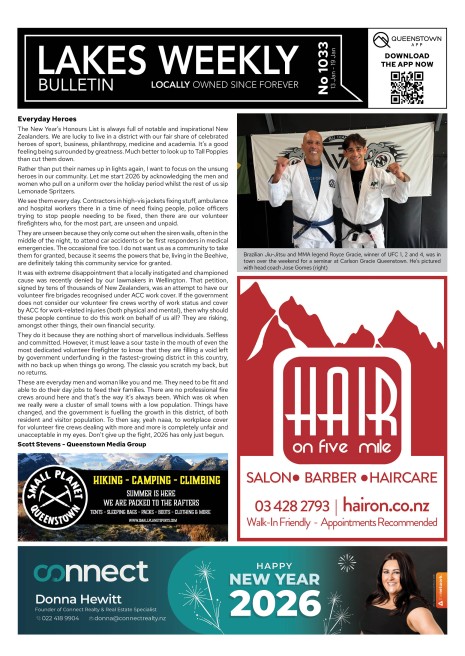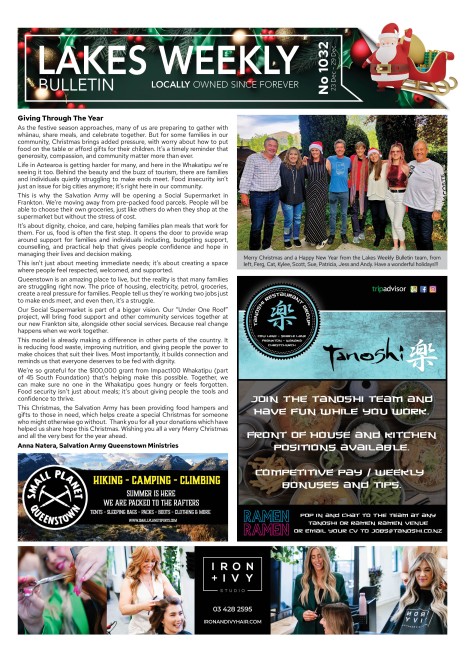Charities feeling cost of living bite

Belts are tightening as astronomically high living costs bite, purse strings too, affecting those heavily reliant on the Wakatipu community’s hugely generous heart.
Charities around the country are apparently reporting lower donations and that’s certainly been the case locally, most help agencies say. KiwiHarvest Queenstown manager Gary Hough even says he’s noticed an apathy and ‘get a job and help yourself’ attitude emerging among some locals, for whom the generosity gestures are waning as more people face their own financial pressures. However, Gary says most of the 800 people they help weekly are families in full employment. Less surplus food is coming in and KiwiHarvest’s Central Lakes winter campaign has only reached $665 of its much needed $50,000 target in two months. Other local help agencies that rely heavily on KiwiHarvest for fresh produce and chilled goods are also feeling the pinch.
Baskets of Blessing’s Ang Gibson says, “absolutely all donations are down – financial and food”, meaning they have to apply for more funding from grants. “That’s normally the money we’d use for facility hire and storage, but it’s increasingly needed now to purchase good nutritious food,” she says.
The decline in donations began in February, but demand is still huge, she says. “Increasingly, these are average Kiwi families with both parents working and they’re needing a lot of help. Everyone’s affected, not just one demographic.” There’s also been a lot of illness in the community, often financial and mental health struggles post Covid.
“People used to be able to make do but can’t now.” Grant funding received this year too wasn’t the full amount they’d requested due to increased demand from all organisations.
Baskets of Blessing volunteers turned out 3000 more meals for the year ending June this year than the previous year. They fed 5729 people in 2021 and 8256 last year. Food hampers doubled and gift baskets increased too.
Happiness House manager Lena Boss says winter’s been tougher. “There’s less fresh produce coming in and everything is so expensive.” Weekly food parcel needs have increased and there’s been more working holiday visa people seeking help, forced to take time off work for whatever reason, and not covered by NZ Government support. “We’re seeing more families, some long-term locals we wouldn’t normally see, saying they really need help, single parents too, often facing high rents,” she says. However, she’s grateful to the regular dried food donors and several local hunters who donate meat, venison, sausages and mince, all processed. Raeward Fresh also donates a large box of in date fresh fruit and produce weekly, and Ma Boulangerie and Fergbaker bread and pastries.
Hospice Store manager John (Boggy) McDowell says shop takings are up and he’s been trading very well with shoppers seeking the repurposed option, and clothing donations up too. “The vibe is the cost of living here is getting too high, particularly for the younger ones, and they’re donating their clothing before they leave,” he says.
Meanwhile, Salvation Army Director Community Ministry Andrew Wilson says their family stores have been finding it tougher this financial year, maybe due to staffing challenges. While there are always nay-sayers in every community he’s still heartened by the beautiful, wonderful caring people helping in this community.
Good Bitches Baking spokesperson Hannah Molloy says volunteer bakers for their Queenstown Central Otago chapter have increased from 34 to 51 in the last four months, supporting 10 recipient organisations. “People aren’t shying away. It’s really accessible. If you can’t afford it one month you don’t have to bake and we have a ‘Cup of Sugar’ Fund for any bakers struggling financially,” says Hannah. “The impact we hear from that tiny piece of baking is massive – a moment of respite or sense of connection if people are having a bad day.”
Central Lakes Family Services general manager Tina Mongston says everybody is feeling the extra stresses and pressures right now. Basic living costs and housing, even money to go to the GP, are all massive issues, she says. “When that happens people start trimming back on what they can give, whether that’s something physical or friendliness.”
“I don’t think there’s an apathy out there, but people’s energy is low. I don’t think they don’t care. They’re just working long hours with a lot on,” she says.
While Centre client numbers are similar the issues are more complex, including finding housing, with separated families even choosing to remain living together because there’s no housing.
Tina’s noticed too that rescue food, especially fresh produce, is down quite a lot. “There’s more thought going into who gets food as there’s a shortage.”
Even if money is tight, she urges locals who can, to give – “any little thing can go a long way”, and to volunteer every now and then to help pack or deliver.








